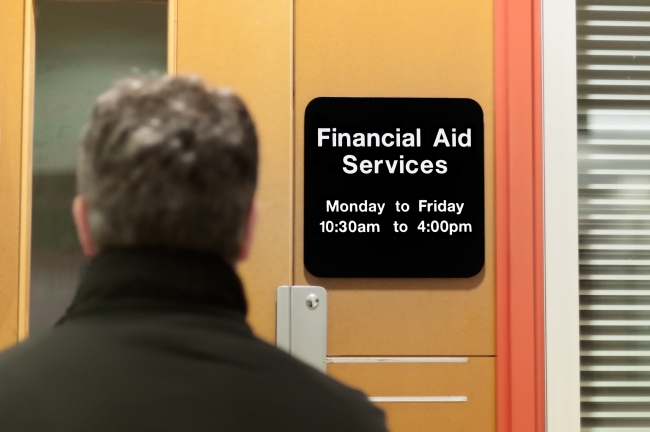You have /5 articles left.
Sign up for a free account or log in.

PamelaJoeMcFarlane/iStock/Getty Images Plus
Maya* and Noah, Georgetown Law students from socioeconomically disadvantaged families, are hungry. Their kids are, too. Lauren, a student with a psychiatric disability, does not have money for medicine she needs to attend class. Although each obtained federal loans to cover the cost of tuition, the government limits living expense aid to what it deems the standard cost of attendance—which, for these and many other students, is not enough.
While national attention rightly concentrates on excessive student debt, there has been little conversation about the opposite problem: underborrowing. Consequently, many students without money feel they have two options. They can drop out, or they can or skimp on necessities to the point where they jeopardize their ability to graduate and repay outstanding loans.
As financial aid administrators at Georgetown Law, we were upset to see how many students struggle with food insecurity—and shaken by how many institutions do not inform them of a good solution: for essentials, students in need can request an increase to the standard loan limit. Professional and graduate schools fail to publicize that administrators can raise the limit for students with special circumstances because schools are afraid an increase will trigger a federal audit.
Now, for the first time, federal law requires higher education institutions to at least disclose the availability of extra aid for necessities. Unfortunately, fewer than 50 percent of financial aid administrators say they are on target to comply with the mandate by a July 1 deadline.
Taking out more loans to finish a professional degree is not always a bad thing—if completion pays off. While overborrowing can bankrupt students in degree programs unlikely to lead to employment, for students whose degrees will position them for professional careers—such as law students—underborrowing is often riskier than overborrowing (especially when federal income-driven repayment plans let graduates pay off their student loans on a sliding scale over 10 to 25 years).
So, while it may seem counterintuitive, we encourage higher education staff nationwide—and not just financial aid administrators—to alert students who they know come from a socioeconomically disadvantaged background, deal with food insecurity or receive disability accommodations to request additional aid.
After Senate Republicans and Democrats raised the issue of underborrowing with the Trump administration during the COVID-19 crisis, the government clarified that institutions that document the circumstances surrounding an administrator’s decision to increase the loan limit will not face an audit as a result. In a letter to the administration, these lawmakers encouraged institutions to “proactively reach out to students” about the availability of extra aid if their income situation changes. But the needs of students with special circumstances persisted after the pandemic, as did the reluctance of institutions to increase loan limits—necessitating the change in law.
The new bipartisan law is part of a legislative package aimed at disentangling a federal aid form that is nearly as hard to complete as a degree. The FAFSA (Free Application for Federal Student Aid) Simplification Act also prohibits institutions from having a policy of rejecting all requests to borrow beyond the standard limit. And it expands special circumstances that administrators may consider when making adjustments to include, among other things, severe disabilities and dependents enrolled in college.
Today, we urge that all student advisers, campus ministers, campus childcare providers and even other students refer underresourced students to financial aid counselors for additional aid. Meanwhile, even before students enroll, financial aid administrators must underscore to admitted applicants that borrowing too much can limit future opportunities and borrowing too little can destroy the present day and future.
Food insecurity is a hidden problem among graduate students nationwide. Nearly half of them lack access to enough food for an active, healthy life. What’s perhaps worse, more than half of students who meet the criteria for food insecurity are unaware of their malnourishment. Not only are hungry students shortchanging their education, but they also report significantly higher rates of depression and anxiety.
Older students with families have even more mouths to feed. Other populations at risk of not completing graduate programs are underrepresented students of color and those from families with limited financial resources. Administrator discretion can make the difference between a disadvantaged student earning a degree and the accompanying social power or never even enrolling.
The onus on students to discover that adjustments exist and schedule an appointment for more information hits those with disabilities especially hard because they often have to trek to doctors, therapists or other administrators, trips that already detract from schoolwork.
Despite predictions otherwise, nationally, no evidence shows a strong relationship between the availability of larger loans for law school students and increased debt. (After Georgetown Law’s workforce changed its messaging to students, the average indebtedness of our borrowers barely budged from $166,000 in 2016 to $168,000 for the J.D. Class of 2023, even with cost of attendance increases of more than 25 percent.) Nor is a high level of debt the main driver of default for higher education students. Rather, dropouts account for half of the people who default on student loans, while for the nation’s J.D. Class of 2021, the most recent class studied, nearly 90 percent were employed in jobs for which a legal education is required or preferred, earning a median salary of $80,000 within a year of graduating. And higher education institutions still face audits if they do not report loan adjustment decisions and have documentation to support the determination of a student’s special circumstances.
Maya, Noah and Lauren ultimately did borrow more funds. Today, their work at a legal services nonprofit organization, a multinational law firm and an appellate court makes a difference in the world and pays down their debt.
*All student names are pseudonyms to protect privacy.




